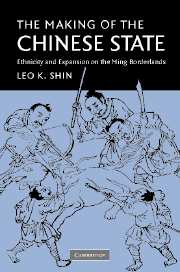Book contents
5 - Culture of demarcation
Published online by Cambridge University Press: 15 December 2009
Summary
Unlike the wo in the south, the lu in the north, and the fan in the west, each of whom has primarily one set of customs, the various yi in the southwest are not only numerous in type but are also distinct in their customs and practices.
Wang Shixing, Record of Extensive Travels (pref. 1593)In the winter of 1452–53, a memorial was submitted to the Jingtai emperor by the supreme commander of Guangdong and Guangxi concerning the southern border region. According to Wang Ao (1384–1467), who had been appointed to the newly created post in part as a response to the uprising of Huang Xiaoyang in 1449–50, the trouble with the region was that local officials were ill-prepared for the task of pacifying the native people (tu ren). Wang Ao observed that even though the natives there were “not of the same variety” (zhong lei fei yi) – among the different zhong lei he identified were sheng Yao, shu Yao, Zhuang, Kuan, Ling, and Lao – and that their languages and clothing were distinct from those common in the central dominion, their temperament was not dissimilar to that of the registered subjects (min) of the state. The primary concern of the tu ren, according to Wang Ao, was their own livelihood. It was not the disposition (ben xin) of the natives to rebel; only when they were pushed (by unscrupulous officials, in particular), Wang observed, would they band together to cause troubles.
- Type
- Chapter
- Information
- The Making of the Chinese StateEthnicity and Expansion on the Ming Borderlands, pp. 138 - 183Publisher: Cambridge University PressPrint publication year: 2006



